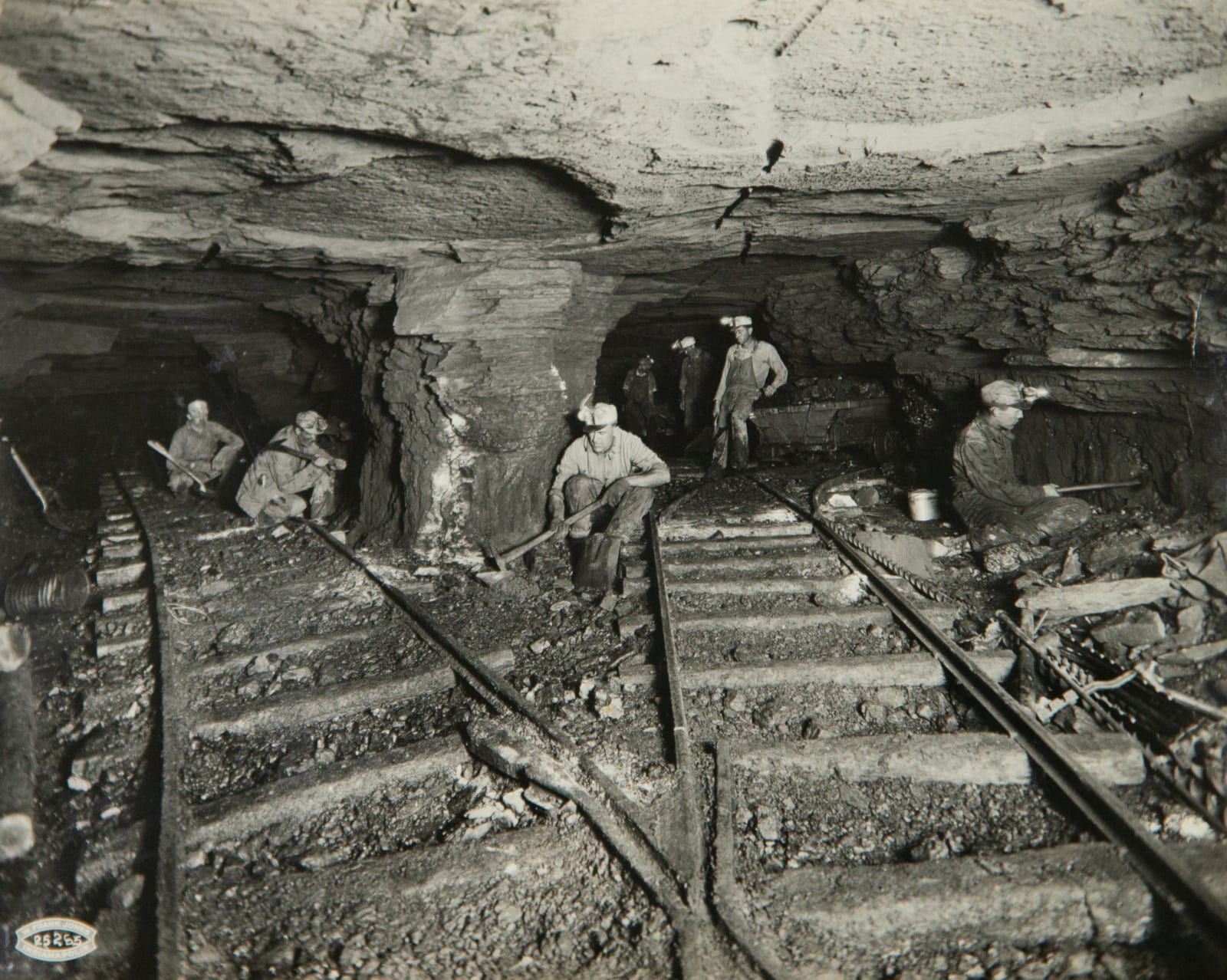W. Frank Jones
Company album for the Minnessee Coal and Timber Co., c. 1920
Photo album; Silver prints (15)
Each 8 x 10 inches, one two-part panorama
Most with W. Frank Jones' credit in the negative.
Most with W. Frank Jones' credit in the negative.
Sold
Further images
-
(View a larger image of thumbnail 1
)
![[Rodney King], Dramatic Aerial Views of the Los Angeles Uprising, 1992](https://artlogic-res.cloudinary.com/w_150,h_150,c_fill,f_auto,fl_lossy,q_auto/artlogicstorage/dollc/images/view/367803351eccef49ed70a8b7ac98f896j/daniel-oliver-w.-frank-jones-company-album-for-the-minnessee-coal-and-timber-co.-c.-1920.jpg)
-
(View a larger image of thumbnail 2
)
![[Rodney King], Dramatic Aerial Views of the Los Angeles Uprising, 1992](https://artlogic-res.cloudinary.com/w_150,h_150,c_fill,f_auto,fl_lossy,q_auto/artlogicstorage/dollc/images/view/f5d2f1d80c56c8dd75356923c1cae0f2j/daniel-oliver-w.-frank-jones-company-album-for-the-minnessee-coal-and-timber-co.-c.-1920.jpg)
-
(View a larger image of thumbnail 3
)
![[Rodney King], Dramatic Aerial Views of the Los Angeles Uprising, 1992](https://artlogic-res.cloudinary.com/w_150,h_150,c_fill,f_auto,fl_lossy,q_auto/artlogicstorage/dollc/images/view/8ef6162be87e24b3f0e03bd0cf3fd3a7j/daniel-oliver-w.-frank-jones-company-album-for-the-minnessee-coal-and-timber-co.-c.-1920.jpg)
-
(View a larger image of thumbnail 4
)
![[Rodney King], Dramatic Aerial Views of the Los Angeles Uprising, 1992](https://artlogic-res.cloudinary.com/w_150,h_150,c_fill,f_auto,fl_lossy,q_auto/artlogicstorage/dollc/images/view/b09bee45eb5dc198fb0f424deace7383j/daniel-oliver-w.-frank-jones-company-album-for-the-minnessee-coal-and-timber-co.-c.-1920.jpg)
-
(View a larger image of thumbnail 5
)
![[Rodney King], Dramatic Aerial Views of the Los Angeles Uprising, 1992](https://artlogic-res.cloudinary.com/w_150,h_150,c_fill,f_auto,fl_lossy,q_auto/artlogicstorage/dollc/images/view/7838d2fd9e50886745990d8f9a02606fj/daniel-oliver-w.-frank-jones-company-album-for-the-minnessee-coal-and-timber-co.-c.-1920.jpg)
-
(View a larger image of thumbnail 6
)
![[Rodney King], Dramatic Aerial Views of the Los Angeles Uprising, 1992](https://artlogic-res.cloudinary.com/w_150,h_150,c_fill,f_auto,fl_lossy,q_auto/artlogicstorage/dollc/images/view/06ada6a8c510f30e15de27cc516dfb5aj/daniel-oliver-w.-frank-jones-company-album-for-the-minnessee-coal-and-timber-co.-c.-1920.jpg)
-
(View a larger image of thumbnail 7
)
![[Rodney King], Dramatic Aerial Views of the Los Angeles Uprising, 1992](https://artlogic-res.cloudinary.com/w_150,h_150,c_fill,f_auto,fl_lossy,q_auto/artlogicstorage/dollc/images/view/574bcf4ba92ea5c51a86df948d7a6383j/daniel-oliver-w.-frank-jones-company-album-for-the-minnessee-coal-and-timber-co.-c.-1920.jpg)
-
(View a larger image of thumbnail 8
)
![[Rodney King], Dramatic Aerial Views of the Los Angeles Uprising, 1992](https://artlogic-res.cloudinary.com/w_150,h_150,c_fill,f_auto,fl_lossy,q_auto/artlogicstorage/dollc/images/view/cf351f3e2c383ced7c20cdf26e378af6j/daniel-oliver-w.-frank-jones-company-album-for-the-minnessee-coal-and-timber-co.-c.-1920.jpg)
A black photo album embossed with the name of the Minnessee Coal & Timber Company, which operated in Cumberland County, TN around the turn of the 20th century. The album...
A black photo album embossed with the name of the Minnessee Coal & Timber Company, which operated in Cumberland County, TN around the turn of the 20th century. The album contains 15 linen-backed photographs from the business’s property, showing both its mining and timber operations in “Isoline, Tenn.” No record of Isoline exists that we could find, which suggests that it was an informal community rather than an incorporated locale.
The richly-detailed photographs are credited to commercial photographer W. Frank Jones of Indianapolis. . Particularly striking is a photograph from inside the mine, taken at a junction where the tunnel splits off in two directions. Seven men are shown hard at work, with crouched posture and weary body language. The remainder of the images show the mines, management, coal house, and lumber yards, including a two-panel panorama.
Towards the back of the album are a series of letter copies, including one photographic reproduction and several typed copies. These letters concern the operation of the mine, including one letter addressed to Tennessee State Senator E. N. Haston, and several letters addressed to E. P. Floren of Indianapolis from investors discussing their eagerness to partake in the venture. “I have taken advantage of a short vacation to visit the mining properties, in which I invested money in a few weeks ago, and just returned yesterday. / I am very well satisfied,” reads a letter dated July 31st, 1920.
Coal mining in Tennessee did not take off as an industry until after the conclusion of the Civil War. The U.S. Census in 1840 reported only two coal producers in the state, but by 1890, Tennessee had become the thirteenth largest producer of coal in the country. The Tennessee Department of Environment & Conservation describes Tennessee’s modern day coal production as “small but generally high quality.”
The richly-detailed photographs are credited to commercial photographer W. Frank Jones of Indianapolis. . Particularly striking is a photograph from inside the mine, taken at a junction where the tunnel splits off in two directions. Seven men are shown hard at work, with crouched posture and weary body language. The remainder of the images show the mines, management, coal house, and lumber yards, including a two-panel panorama.
Towards the back of the album are a series of letter copies, including one photographic reproduction and several typed copies. These letters concern the operation of the mine, including one letter addressed to Tennessee State Senator E. N. Haston, and several letters addressed to E. P. Floren of Indianapolis from investors discussing their eagerness to partake in the venture. “I have taken advantage of a short vacation to visit the mining properties, in which I invested money in a few weeks ago, and just returned yesterday. / I am very well satisfied,” reads a letter dated July 31st, 1920.
Coal mining in Tennessee did not take off as an industry until after the conclusion of the Civil War. The U.S. Census in 1840 reported only two coal producers in the state, but by 1890, Tennessee had become the thirteenth largest producer of coal in the country. The Tennessee Department of Environment & Conservation describes Tennessee’s modern day coal production as “small but generally high quality.”







